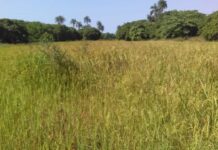By Sarjo Camara Singateh Action Aid International The Gambia is conducting a three day message development workshop with partners in development at the National Malaria control program/ CIAM conference hall at the Kanifing institutional area. The message developed is to form the basis of advocacy and sensitisation campaigns during the three-year project that aims at promoting women’s socio-economic rights in the Niamina East, Niamina West and Niamina Dankunku Districts in the Central River Region (CRR) with funding from the European Union (EU). This project aims at contributing to gender equity in the Gambia, by promoting women’s access to socio-economic rights and economics empowerment. Speaking at the meeting, the Executive Director AAITG Mr. Omar Badjie said the purpose of this workshop is to produce a number of messages that will form the basis of the advocacy and sensitisation campaign. In addition, the messages will be disseminated through the print media, radio, video and drama. He said in developing this messages consistency is very key. He noted that messages are crucial in helping to build self-confidence. Mr. Badjie urged the participants to share their ideas to enable them contribute immensely to the success of the project. Fanta Jatta Sowe, women’s rights manager, Action Aid International The Gambia stated that based on the outcome of this workshop, women groups will be trained to conduct drama performances on the empowerment of women. This activity will promote the sharing of information among women groups and networks. She said the overall objective of the EC project is to contribute to gender equity in the Gambia by promoting women’s access to socio-economic rights and economic empowerment among other things. She noted that the main focus of the project is that land ownership by women in The Gambia is traditionally based on membership in a clan of common decent by inheritance, communal holding and individual inheritance. She further stated that the productive resources are mostly owned and controlled by men. According to African- Women- Decade 2010 to 2020; the 2012 review on women’s economic empowerment in the Gambia, stated that agriculture forms the basis of secure livelihoods for the majority of the population. Women have played and continue to play vital roles in the process of agricultural development and currently provide about 75% of the agricultural labour force. Women’s access to land is nevertheless limited in the Gambia. Under customary practices women borrow rather than own the land they cultivate from their husband, their husband’s family or other village members. While the law does not discriminate against women in the area of access to bank loans and credit facilities, banks will often require guarantees in the form of land, which most women are unable to provide. Hence, women who benefit from loans and credits often do so through schemes run by NGOs.]]>
Home Latest News National Promoting women’s socio-economic rights is fundamental to national development




















